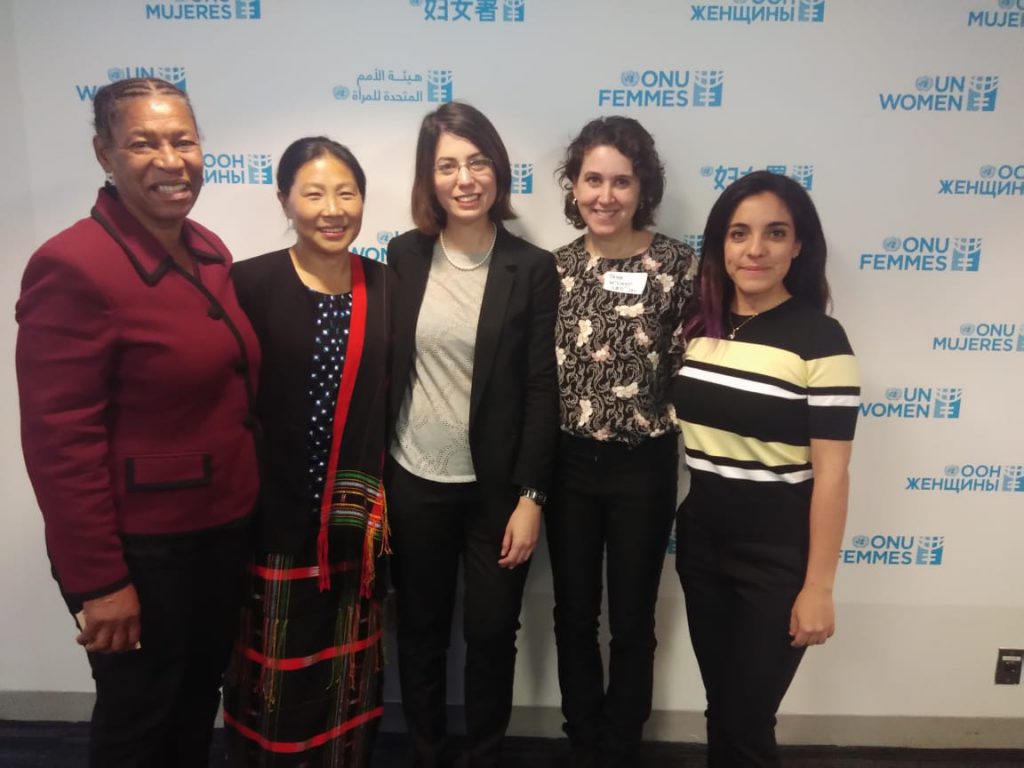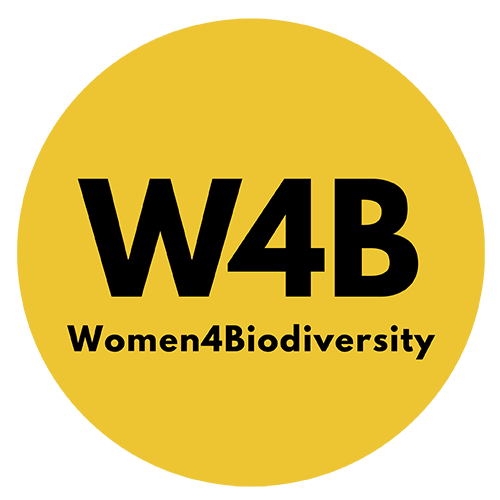
by Ana Di Pangracio, Deputy Director at FARN and CBD Women Caucus Advisor
This statement was originally published in the environmental supplement of the Argentine newspaper Perfil on May 22, 2020, on the occasion of the International Day for Biological Diversity.
The natural systems that make Life on Earth possible, which obviously includes human existence, are in danger. Our relentless demand for resources accelerates species extinction rates and devastates entire ecosystems. This jeopardizes most of nature´s contributions to people; some of them irreplaceable. A million plant and animal species could disappear in the coming decades, and the current scenario is no better: we have already significantly altered 75% of the land-based environment and 66% of the marine environment (IPBES, 2019).
In these times of the COVID-19 pandemic, it should be noted that nature is essential to guarantee the human right to health. Biodiversity sustains food, fresh water and medicine, while providing us with recreation and enjoyment.
The main causes, direct and indirect, of biodiversity loss have a name and surname: they are land and sea use change, and our production and consumption patterns, respectively (IPBES, 2019). In these times of the COVID-19 pandemic, it should be noted that nature is essential to guarantee the human right to health. Biodiversity sustains food, fresh water and medicine, while providing us with recreation and enjoyment. Mandatory quarantines have made evident the importance of green areas in cities, which is where more than 50% of the world population already lives.
COVID-19, a coronavirus of zoonotic origin, has renewed public attention on wildlife use and conservation. In this sense, it is necessary that the efforts focus on carrying out conservation initiatives that promote resilient livelihoods, with governance systems that ensure a responsible, regulated and sustainable use of natural assets, in order to facilitate their long-term preservation (Roe, D. 2020); with respect for the rights of indigenous peoples and local, peasant and traditional communities, with a gender perspective, and protection of nature defenders.
The COVID-19 crisis, the human suffering it means, is a sad and clear example of how ignoring the biodiversity loss crisis can have severe, even irreparable, socioeconomic consequences. The more ecosystems we destroy, the more in danger we are. It is time to listen to science, which for years has been warning about the seriousness of the situation and its implications.
When the world still could not even suspect the health emergency that would soon follow, for the United Nations this 2020 was the “super year of nature” due to the process that takes place within the framework of the Convention on Biological Diversity (CBD) -of almost universal adherence and ratified by my home country, Argentina-, aimed at adopting a new 10-year action plan to reverse the ecological crisis. And this May 22, International Biodiversity Day, is one of the communications and awareness-raising milestones, on the road to the next Biodiversity Summit in China.
The way out of this human-health crisis cannot exacerbate the prevailing ecological and climate crisis; neither inequality, or injustice.
Although the process is logically delayed by COVID-19, this pandemic must ultimately lead us to a reflection that is as obvious as it is substantial: it is time to accept, once and for all, that we are not a separate entity from nature. The way out of this human-health crisis cannot exacerbate the prevailing ecological and climate crisis; neither inequality, or injustice. It needs to be an opportunity to overcome the limited visions that a good quality of life is only achieved through economic growth and limitless accumulation. The chance for the international community to set a post-2020 global biodiversity framework and financial resources rise to the challenge, as to rebuild our societies from hope, solidarity and collective work at all levels. If there is a possible way out, establishing a world that lives in harmony with nature is our door.
IPBES (2019): Global assessment report on biodiversity and ecosystem services. E. S. Brondizio, J. Settele, S. Díaz, and H. T. Ngo (editors). IPBES secretariat, Bonn, Germany. XXX pages.
Roe, D (2020) Despite COVID-19, using wild species may still be the best way to save them. IIED.
Si Hay Una Salida, Cuidar La Naturaleza Es La Puerta
Ana Di Pangracio. Directora Adjunta (FARN), Consejera (CBD Women Caucus)
Esta columna fue originalmente publicada en el suplemento ambiental del diario argentino Perfil el 22 de mayo de 2020, con motivo del Día Internacional de la Diversidad Biológica.
Los sistemas naturales que hacen posible la Vida en la Tierra, lo que obviamente incluye la existencia humana, se encuentran en peligro. Nuestra implacable demanda de recursos acelera las tasas de extinción de especies y devasta ecosistemas enteros. Esto pone en riesgo la mayoría de las contribuciones que la naturaleza hace a las personas; algunas de ellas, irremplazables. Un millón de especies vegetales y animales podría desaparecer en las próximas décadas, y el escenario actual no es mejor: ya hemos alterado significativamente el 75% de la superficie terrestre y un 66% de la marina (IPBES, 2019).
En estos tiempos de pandemia COVID-19, corresponde resaltar que la naturaleza es esencial para garantizar el derecho humano a la salud. La biodiversidad sustenta alimentos, agua dulce y medicinas, a la vez que nos proporciona recreación y esparcimiento .
Las principales causas, directas e indirectas, de la pérdida de biodiversidad tienen nombre y apellido: son el cambio de uso de la tierra y el mar, y nuestros hábitos de producción y consumo, respectivamente (IPBES, 2019). En estos tiempos de pandemia COVID-19, corresponde resaltar que la naturaleza es esencial para garantizar el derecho humano a la salud. La biodiversidad sustenta alimentos, agua dulce y medicinas, a la vez que nos proporciona recreación y esparcimiento. Las cuarentenas obligatorias han hecho evidente la importancia de las áreas verdes en ciudades, que es donde ya habita más del 50% de la población mundial.
La COVID-19, un coronavirus de origen zoonótico, ha renovado la atención pública sobre el uso y la conservación de fauna silvestre. Es necesario, en este sentido, que los esfuerzos se enfoquen en llevar adelante iniciativas de conservación que promuevan medios de vida resilientes y con sistemas de gobernanza que aseguren un uso responsable, regulado y sostenible de los bienes naturales, a fin de facilitar una preservación a largo plazo (Roe, D. 2020); con respeto por los derechos de pueblos indígenas y comunidades locales, campesinas y tradicionales, con enfoque de género, y resguardo de personas defensoras de la naturaleza.
La crisis de la COVID-19, el sufrimiento humano que significa, es una triste y clara muestra de cómo ignorar la crisis de pérdida de biodiversidad puede tener consecuencias socioeconómicas severas, incluso irreparables. Cuanto más se alteran los ecosistemas, más peligro corremos. Es tiempo de escuchar a la ciencia, que desde hace años advierte sobre la gravedad de la situación y sus implicancias.
Cuando todavía el mundo no podía siquiera sospechar la emergencia sanitaria que sobrevendría en breve, para las Naciones Unidas este 2020 era el “super año de la naturaleza” en razón del proceso que se desarrolla en el marco del Convenio sobre la Diversidad Biológica (CDB) -de adhesión casi universal y ratificado por Argentina-, dirigido a adoptar un nuevo plan de acción a 10 años que permita revertir la crisis ecológica. Y este 22 de mayo, Día Internacional de la Biodiversidad, es uno de los hitos comunicacionales y de generación de conciencia, camino a la próxima Cumbre de Biodiversidad en China.
La salida a esta crisis humano- sanitaria no puede exacerbar la crisis ecológica y climática reinante; tampoco la desigualdad o la injusticia.
Si bien el proceso se encuentra lógicamente demorado por la COVID-19, esta pandemia a la larga tiene que llevarnos a una reflexión tan obvia como sustancial: es tiempo de aceptar, de una vez por todas, que no somos un ente separado de la naturaleza. La salida a esta crisis humano- sanitaria no puede exacerbar la crisis ecológica y climática reinante; tampoco la desigualdad o la injusticia. Necesita ser una oportunidad para superar las visiones limitadas de que una buena calidad de vida solo se alcanza mediante el crecimiento económico y la acumulación sin límites. La chance para que la comunidad internacional esté a la altura del desafío y disponga un marco de acción y recursos financieros suficientes para reconstruir nuestras sociedades desde la esperanza, la solidaridad y el trabajo colectivo a todos los niveles. Si hay una salida posible, instaurar un mundo que viva en armonía con la naturaleza es nuestra puerta.

(L-R): Ruth Spencer (Antigua & Barbuda), Thingreiphi Lungharwo (India), Ana Di Pangracio (Argentina), Tanya McGregor (Gender Programme Officer, SCBD) and Amelia Arreguin (Mexico)
CBD Women Caucus representation at the Expert Workshop


